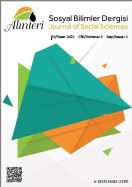CEBELÜLERİN TOPLUMSAL KÖKENLERİ ÜZERİNE
ON THE SOCIAL ORIGINS OF CEBELUS
Author(s): Muhsin SOYUDOĞANSubject(s): Military history, Social history, Military policy, 16th Century, The Ottoman Empire, Socio-Economic Research
Published by: Kastamonu Üniversitesi
Keywords: 1532 German Expedition; Cebelu; Gulam; The Balkans;
Summary/Abstract: Though historians a good many times asked about the social background of cebelus, who constituted one of the most important human resources for the timar army, in general sense the proposed arguments could not go beyond certain assumptions. The most important reason behind that is a lack of systematic data that can reveal their social origin. This study tries to elucidate this question by utilizing a roll-call ledger kept during the military campaign known as the German Expedition against Charles Quint, the King of Spain, in 1532. The ledger is the most comprehensive and the oldest of very few extant fragments of detailed roll-calls containing the ethnic identities of cebelus and the place where they were from. The ledger could not have survived neither as a whole nor as solid. The detected parts during this research are constituted by fourteen fragments all of which belong to sanjaks of Rumeli and were recorded under certain names in the catalogues of the Archive of Top kap ı Palace. Mentioned fragments were analysed only after being transcribed and reunified as its original form. The study is on the one hand trying to understand the ethnic, religious or social status of the cebelus, on the other hand, examining the socio-economic mechanisms that forced people to be cebelu. Thus, the assimilationist function of the timar system, of being included in the state apparatus in a more general sense, is revealed. In this sense the study contributes to understand the phenomenon of Islamization in the Balkans.
Journal: Alınteri Sosyal Bilimler Dergisi
- Issue Year: 5/2021
- Issue No: 2
- Page Range: 139-169
- Page Count: 31
- Language: Turkish

